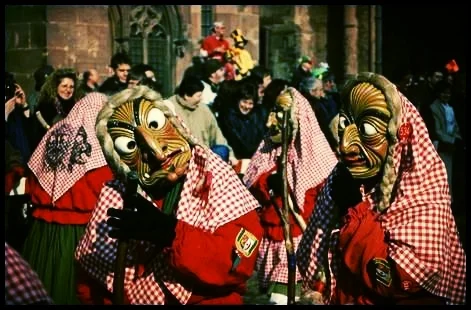Carnival in the Land of the Humourless
Fasching has arrived in Germany and as far as the eye can see there are people dressed as clowns, gorillas and stormtroopers watching parades and floats ambling down the main thoroughfares of major cities…well, at least that’s what my Twitter timeline is telling me. In reality, I’m sat on the sixth floor of a grey looking office block, working. Stepping out of my meeting room, I see rows of desks and people working away instead of colliding with a jovial bunch of pandas drinking mini bottles of schnapps. The only person who looks vaguely in the carnival mood is a young gentleman wearing a traditional Faschingshut, while executing some black belt excel spreadsheeting. Despite the funny hat, his face says anything but “I’m here to party”. When I ask a colleague, it turns out the man is native of Cologne, suffering from a severe case of Fasching withdrawal. Having arrived earlier in the day, the office Faschingkind was devastated to discover that carnival does not extend as far as he expected and was still somewhat shell shocked by the realisation that no one in the office was intending on celebrating his home cities famous holiday.
Call it what you will (Karneval, Fastnacht, Fasching or Karnevalare) but Fasching is a strange beast. Similar events are held around the world, most famously in New Orleans, where Carnival is celebrated with outlandish costumes, parades and a serious amount of drinking. German carnival is no different. It has a number of potential origins, but it is definitely an old festival, with the German version being mentioned by Roman senator and historian Tacitus in the first century. Essentially carnival evolved from a pagan festival celebrating the end of winter, into a Christian pre-Easter celebration. Although it may have changed over the centuries, there are still examples of traditions that date back to Carnivals from the middle ages. The election of Fasching kings/queens/princes/princesses has its origins in the election of temporary town mayors during this period and it is still the practice in some areas of closing the local government offices and handing over a ceremonial key to the newly elected Fasching administration.
Yet Fasching is not universally celebrated in Germany, in some areas it is practically ignored. What makes it all the more confusing is that there is no rule whether a town celebrates or not. One colleague I spoke to mentioned that his village had no official celebration, whereas the villages a few kilometres down the road had street parties and a parade.
Fasching may be enjoyed by many, but not all Germans, yet it remains a source of fascination for non-Germans such as myself who never grew up with the so called 5th season. In the UK for instance, the beginning of Lent is not marked by street parties or mass drinking sessions (aside from the normal British Friday night) but with Shrove Tuesday or as it is better known Pancake Day. I like pancakes as much as the next person, but they hardly compete with the raucous celebrations in Cologne, Mainz or Dusseldorf. This outsider fascination is perhaps because Karneval not only turns cities on their heads, but our perception of Germans in general. The image of the stereotypical straight laced, process obsessed, and humourless German is dramatically challenged by the outpouring of buffoonery that can be witnessed during Fasching.
In the UK, our attention seems to be drawn to the Dusseldorf carnival, where the famous satirical floats can be seen. This year’s selection of course focuses heavily on the current political negotiations around forming a new German government, but domestic politicians are not the only targets. Brexit, Theresa May and Donald Trump all appear in effigy. What marks the floats out for international praise or scorn is the brutal, no holds barred representation of political figures as baby snatchers, Spiders or the love interest of Russian bears. Some see it as accurate depictions of the state of our global society, others that it is disrespectful. This is basically the point. If Halloween is supposed to celebrate the thinning of the veil between the living and the dead, Fasching represents the temporary narrowing of German respect for authority. It is a safe space to laugh and make fun of figures that should usually be paid at least some basics of respect.
Even if this is true and Fasching is a chance for Germany to express the inexpressible within a safe, traditional context, it doesn’t mean that the joke can be pushed too far. In my region of Franken, the recent televised Fasching event saw a troupe of comedians in hot water. The "Feierwehrkapell' n" a troupe of comedic firemen, dressed in old fashioned uniforms made a number of jokes and a song at the expense of Brigitte Macron, wife of the French President Emmanuel Macron, describing her in a number of unflattering ways and comparing her to the meat, aged through a traditional process of hanging it from the ceiling. It may surprise many non-Germans but the current discussion in the English speaking world of what is acceptable or unacceptable in the sphere of comedy has begun to bleed into the German consciousness. How American comedians Bill Burr, Jerry Seinfeld or Dave Chapelle feel about this is anyone’s guess.
There is something so typically German about providing a contextual space to defame, insult and challenge authority figures. It speaks to a certain aspect of the compartmentalisation of German culture, that is often hidden in plain sight. It performs a valuable function, one that can be debated and scolded but is unlikely to change much. Perhaps the recent eruption of the #metoo movement might have an impact, but we may have to wait until next year to fully understand the ramifications.








